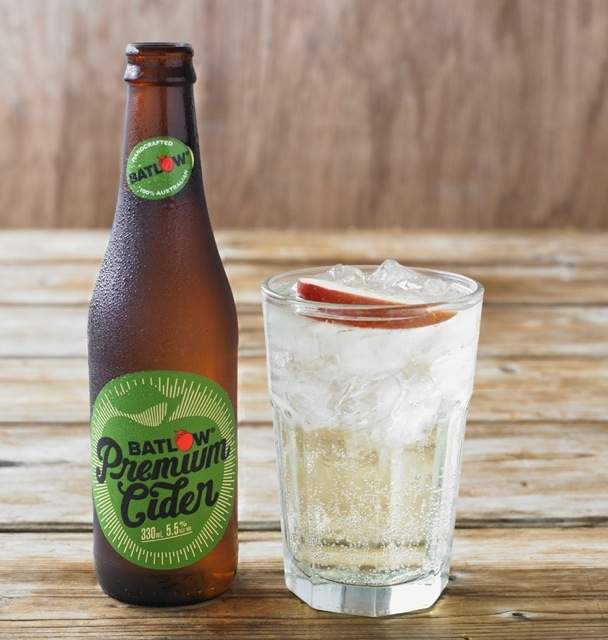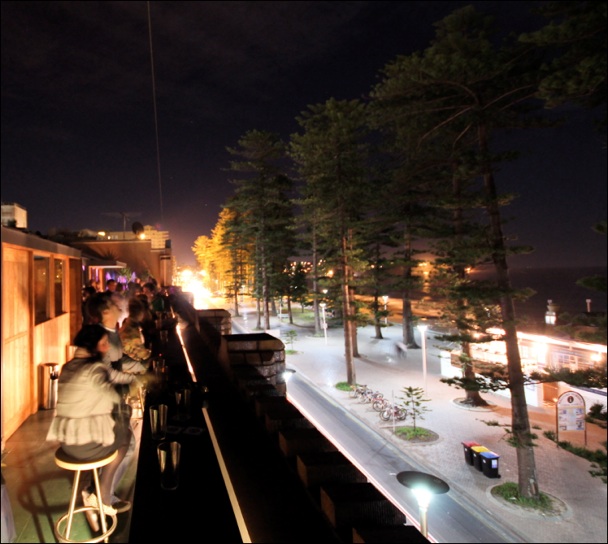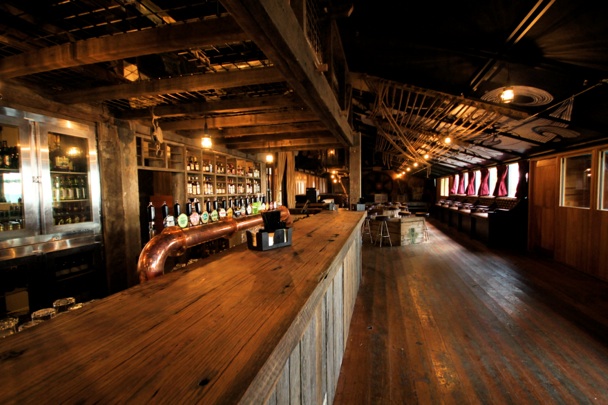Australia’s Boutique Cider Revolution
While a glass of sweet, delicious cider is undoubtedly on trend, we suspect that it will last a little longer than most fads.
Every season has its fashions and fads. This past summer, there was only one thing we spotted more in our favourite bar haunts than hot dogs: cider. While a glass of sweet, delicious cider is undoubtedly on trend, we suspect that it will last a little longer than most.
Concrete Playground speaks to Rich Coombes of Batlow Premium Cider, Brittany Kinter from Moonshine, Hotel Steyne's dedicated cider and rum bar, and Michael Capaldo from Schwartz Brewery, the creator of Sydney Cider, to find out why cider is here to stay.
Why has it taken Sydney so long to catch on to cider? Why is the cider revolution only hitting now?
RC: There was really a lack of quality cider widely available, but now we're seeing an abundance of quality ciders in a range of styles. The category was re-invigorated in the UK recently through a significant increase in marketing activities by major brands, and that had a positive knock-on effect into other markets like Australia. Consumers are also seeking out more from their drinking and dining experiences; they appear to be looking for alternatives to their regular beer or wine selections, and cider provides a versatile option.
Michael, Schwartz Brewery has had the beers under the belt for a while, but what prompted you to move into cider?
MC: Our marketing manager Richard actually came up with the brand years ago. Richard presented the idea of making a cider for Sydneysiders to Dr. Schwartz and the brewing team, and we loved it.
Did you have much experience with cider before embarking on Sydney Cider?
MC: I had made a few batches at home and had produced a range of ciders with my previous employer. Saying that, cider is a very different beast to beer. From a technical point of view it behaves much more like a wine than a beer, so it is a whole new world for us brewers to get used to.
Rich, we all know Batlow Apples but how did Batlow Cider come about?
RC: It was the product of great timing. Batlow Apples were looking at ways of realising value for fruit that may not make the grade for the supermarket shelf and had previously made cider. So when we (my brother Sam and I) approached Batlow Apples looking for a source of top quality apples to make cider, it was complementary to their own plans. Sam and I had spent a fair amount of time in the UK drinking cider, and we realised there was an opportunity to make a locally-made, premium cider using the best cider-making practices. When we shared our cider plans with Batlow Apples, they liked the idea of partnering up and launching a Batlow-branded cider collaboratively. We were on the same page from day one about what we wanted to create and the rest is history.
Can you take us through your processes of making cider? What's the story behind the bottle?
RC: Our cider begins with the apples – and we only use Batlow apples. Through some experimenting, we came up with a varietal mix to give the best balance in terms of acidity and sweetness. We grow, pick and press apples in Batlow and then, the same day, transport the juice to our cidery. There, we ferment, clean filter and bottle. No concentrates, no added sugar, no artificial preservatives and no pasteurisation of the bottle. Our 'minimal intervention' approach means we retain as much of the goodness of the apples as possible and ensures there are about three and a half Batlow apples in each bottle.
MC: We decided that if we were going to make a cider, it had to be refreshing and all natural. We have a fantastic juice supplier who grows cold climate apples, which are perfect for a crisp cider. We use a very unusual yeast imported from France that is actually a champagne yeast. As yeast is the only living ingredient in cider, every strain will produce different flavours. In the case of our yeast, you can certainly assimilate it with the citrusy, tart flavours found in champagne. We then soften up the cider with more fresh apple juice and are left with a beautiful balance of medium sweet fruit on the nose and pallet, which is counterbalanced by subtle acidity.
Rich, for those who are yet to partake, what's the appeal of Batlow Cider?
RC: Our cider has the freshness of a crunchy Batlow apple. The flavour gives a complex mix of green and red apples, with a hint of earthiness. It's crisp, clean and has just the right amount of sweetness. We only press apples as we make the cider, which ensures that we retain as much of the natural aromas and flavours of the Batlow apples as possible. We don't add any sugar, concentrates or flavourings like some other ciders on the market, and it's also gluten free for our coeliac friends.
Continuing with the education, what qualities make a great cider?
RC: Great ciders are judged on their aroma and taste. Great cider will produce a delightful aroma of apples – depending on the style of cider, this may be fresh apples or even over-ripe apples. A great cider will offer depth of flavour and complexity, like a wine, offering a fine balance of apple sweetness and acidity. More traditional styles of cider will also display good tannin structure, given cider apples are relatively high in tannin content compared to eating apples. Striking the right balance of sweetness, acidity and tannin is the art to great cider-making.
While Batlow obviously focuses on apple cider, what different kinds of cider are available?
RC: There are now many styles of cider available: from very sweet to very dry, carbonated to still. By definition, cider is made from the fermentation of apple or pear juice and, whilst there are an increasing amount of flavour twists hitting the shelves, the purists would argue these are really getting away from true 'cider'. That said, different regions of the world produce very different ciders. It's worth seeking out some foreign styles, such as French ciders, which offer a completely different drinking experience to more commonly consumed ciders.
How would you describe your cider, Michael? What makes it stand out from the pack?
MC: It certainly sits in the medium sweet category. This means that it has pronounced apple flavours, but their sweetness is balanced by the acidity produced from the yeast. I think in terms of drinkability and versatility, it is one of the best ciders going around. It drinks best neat, and we try to discourage people from drinking it with ice as this can mask the beautiful natural flavours.
While you're obviously a lover of beer as well, what does cider offer that beer doesn't?
MC: From a technical point of view cider has a much lower pH than beer, around 3.3 as opposed to 4, which means its flavours are generally sharper and bitier. I think cider suits the Australian palate very well as we like dry, highly carbonated drinks that refresh on a hot day.
Britt, putting a bar specialising in cider (and rum) in Hotel Steyne – a classic 'pub' pub – is a bit of a brave move. How did this come about?
BK: The cider bar concept originated from our publican Ged. Since he married an Irish girl, he's become familiar with the explosion of cider in Europe, particularly in Celtic countries. With sixty six beer taps downstairs, Ged saw the cider bar as a strategic point of difference for the hotel. He believes that the Australian climate is made for cider. Plus, the 'alco pop' tax is making cider more accessible and affordable.
What is the concept behind Moonshine? Could you describe the look and feel of this bar?
BK: The bar is themed 'seaside grit', with reused old dockside timber bars and weather leather chesterfield booths. It's a seaside, shanty shack atmosphere. There's images of old school, sea man tattoos, bottles from nights passed, and retired seafaring craft from the years gone by. Plus the associated ocean smells and sounds provided naturally and free from the coast just beyond the doors! The bar should see you through the whole weekend, with a hundred rums to try and a folk rock gig to see on a Thursday, to a reggae gig on a Sunday afternoon, whilst sipping on one of the sixteen ciders on tap.
Tell us a bit about the ciders you're serving up. What's your pick?
BK: Our ciders range from sugary sweet to bittersweet, and mildly dry to a smoky dry. My personal fav. at the moment is the Batlow cider. The high quality, delicious taste and attractive branding has captured my attention, along with that of our patrons.
What has the reaction from punters been? Have people taken you up on the offer?
BK: Positive, that's for sure. Young people are looking for the experience and variety that cider has to offer. We constantly get visits from strictly beer drinkers who have yet to jump on the cider wagon but do want to see what all the buzz is about. Before you know it, these 'strict beer drinkers' are frequenting the bar and have a favourite cider. Plus, we're finding that Australians are returning home after time abroad with a liking for cider that they developed on their travels. Here in Manly, we witness the multicultural mix of people firsthand, so there's also nostalgic travellers frequenting the pub in search of recognisable beverages from their home countries.
And finally, to end on a controversial note, what does cider have over the great Australian favourite, beer?
RC: The advantage of cider is that it offers a completely different drinking experience to beer. Some people choose cider because it's a lighter more refreshing alternative to beer or even because it's gluten free. Increasingly we are seeing cider matched with foods in place of craft beer or wine, so it's really quite versatile. We're still a beer-drinking nation, but it's nice to see an ever-growing appreciation of quality cider.
BK: Sydney has the perfect climate for the cider market. There's just something about sitting on the deck, lounging in the sun with your mates, with a cool refreshing cider in hand.









